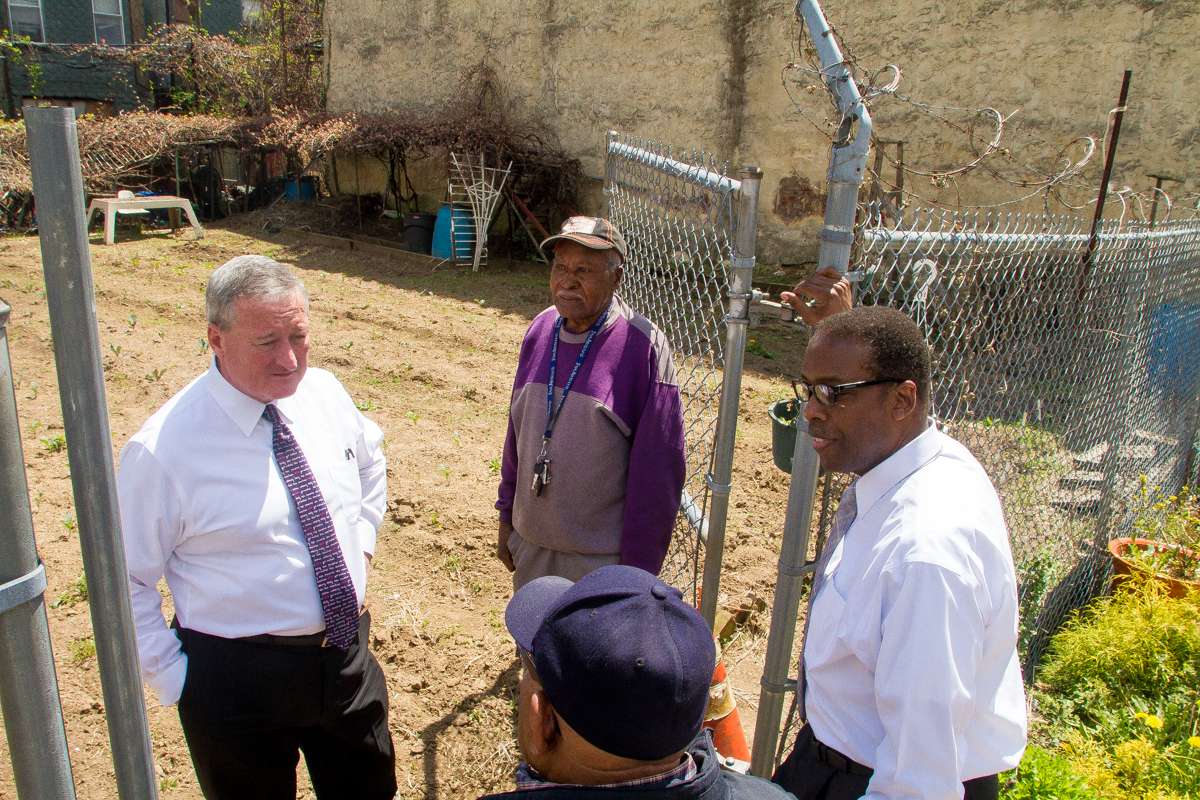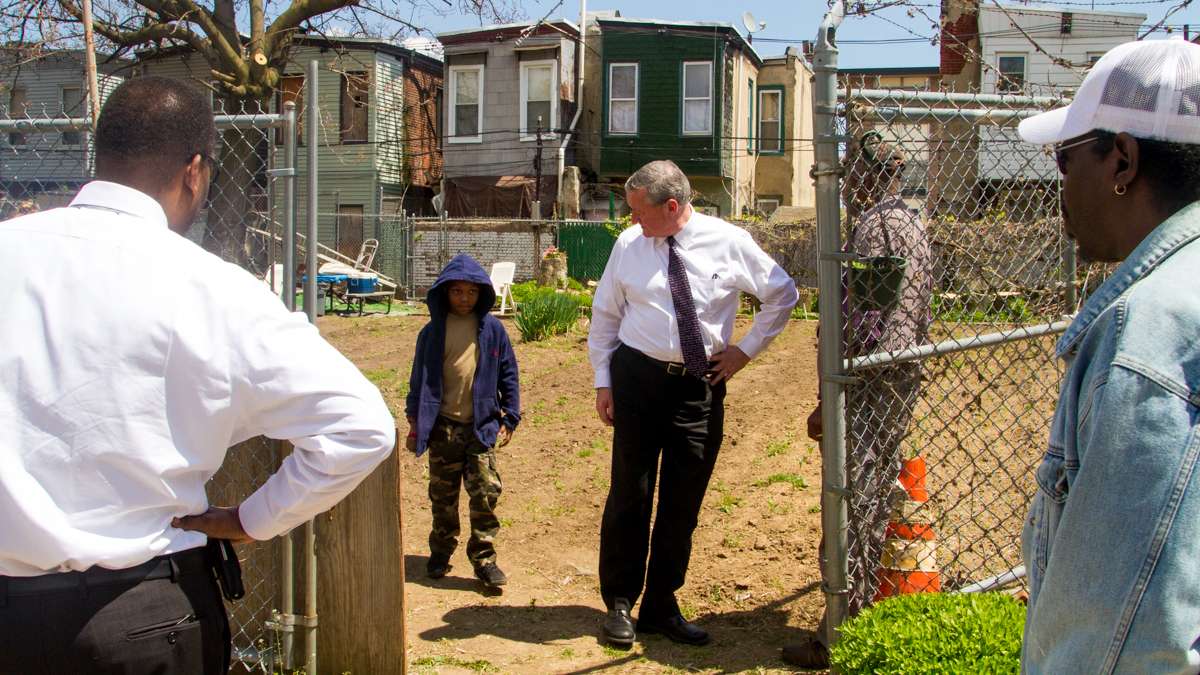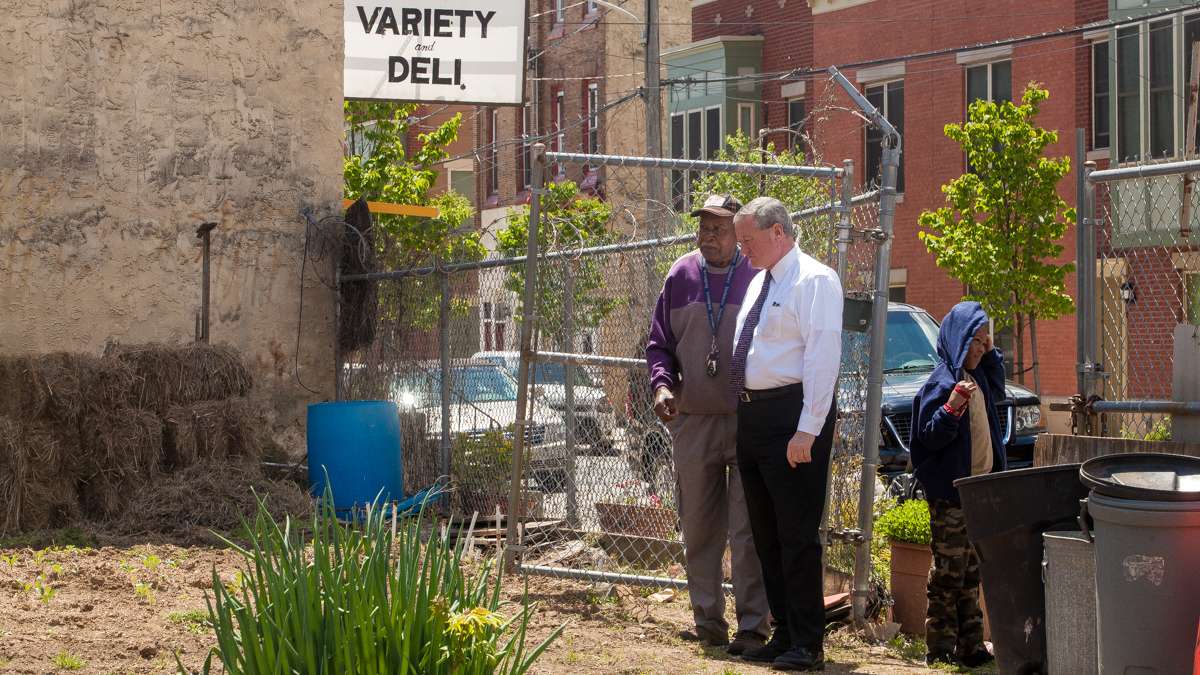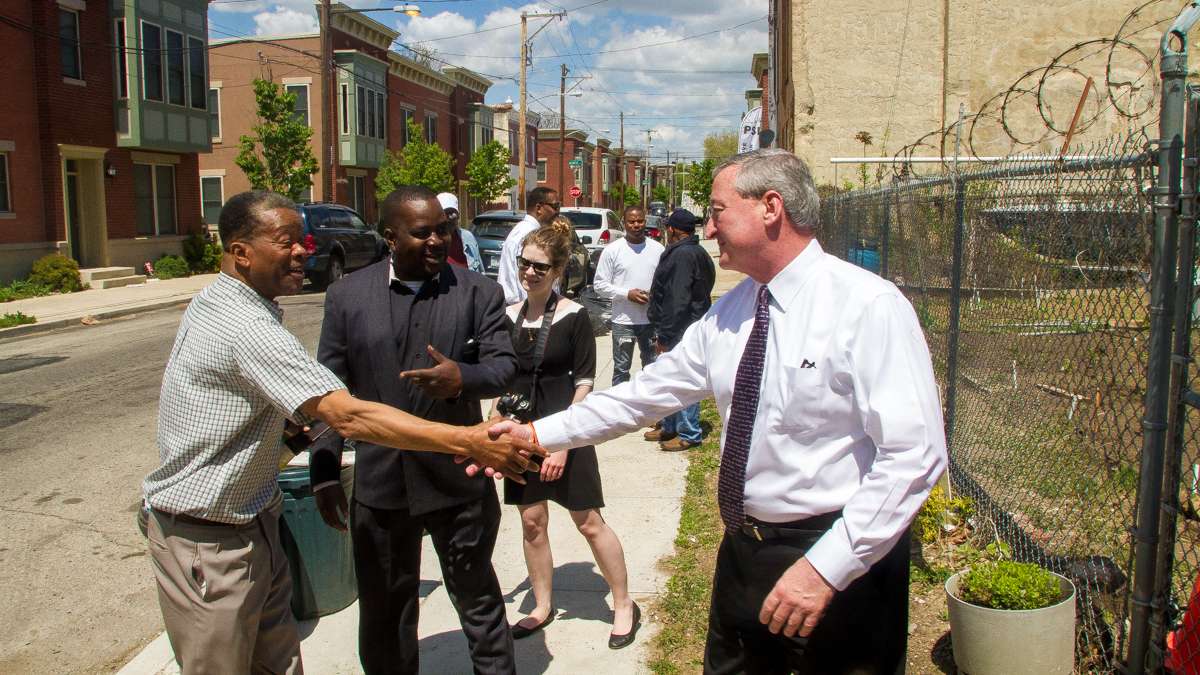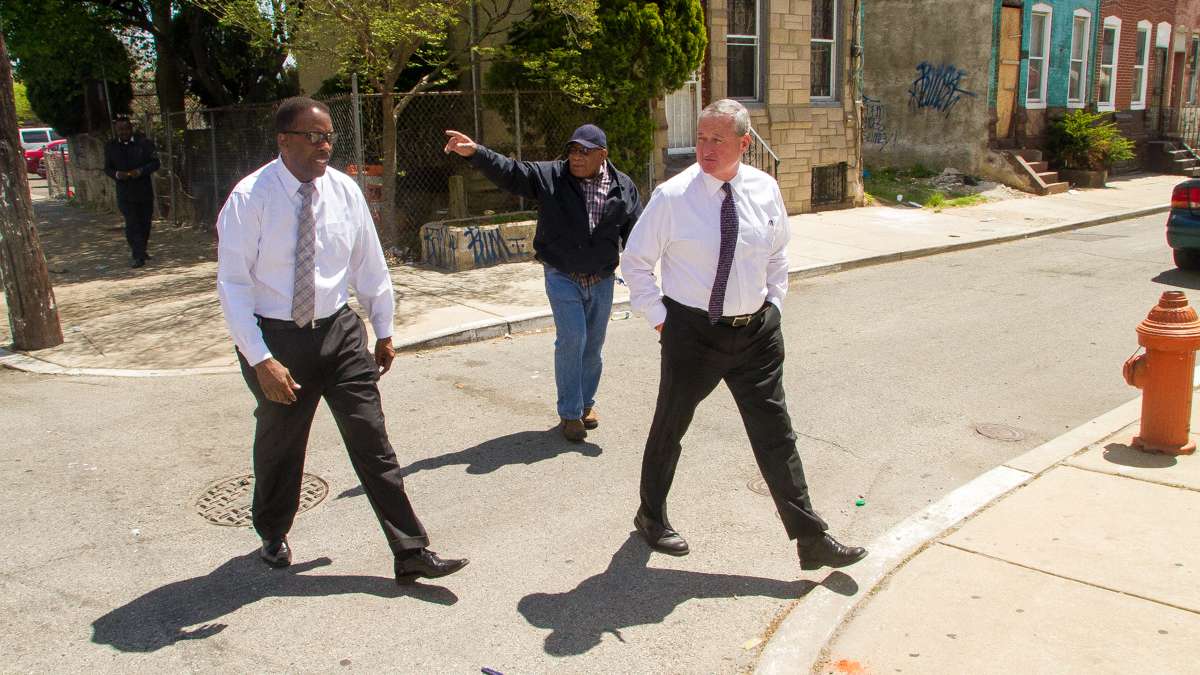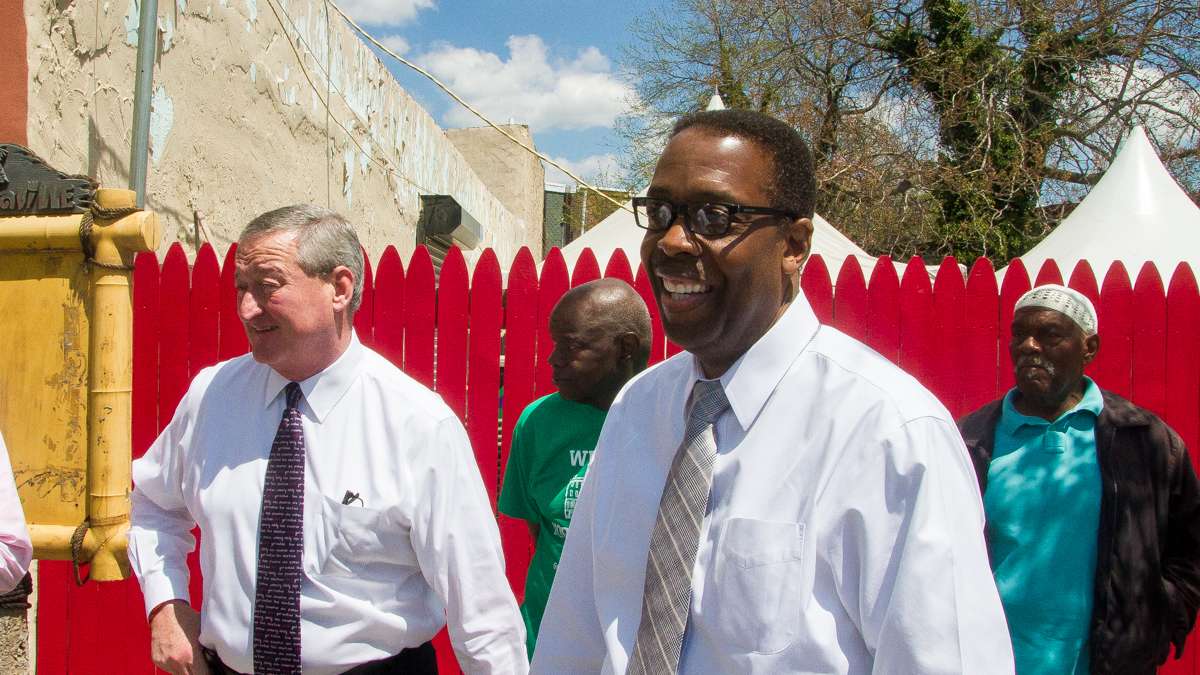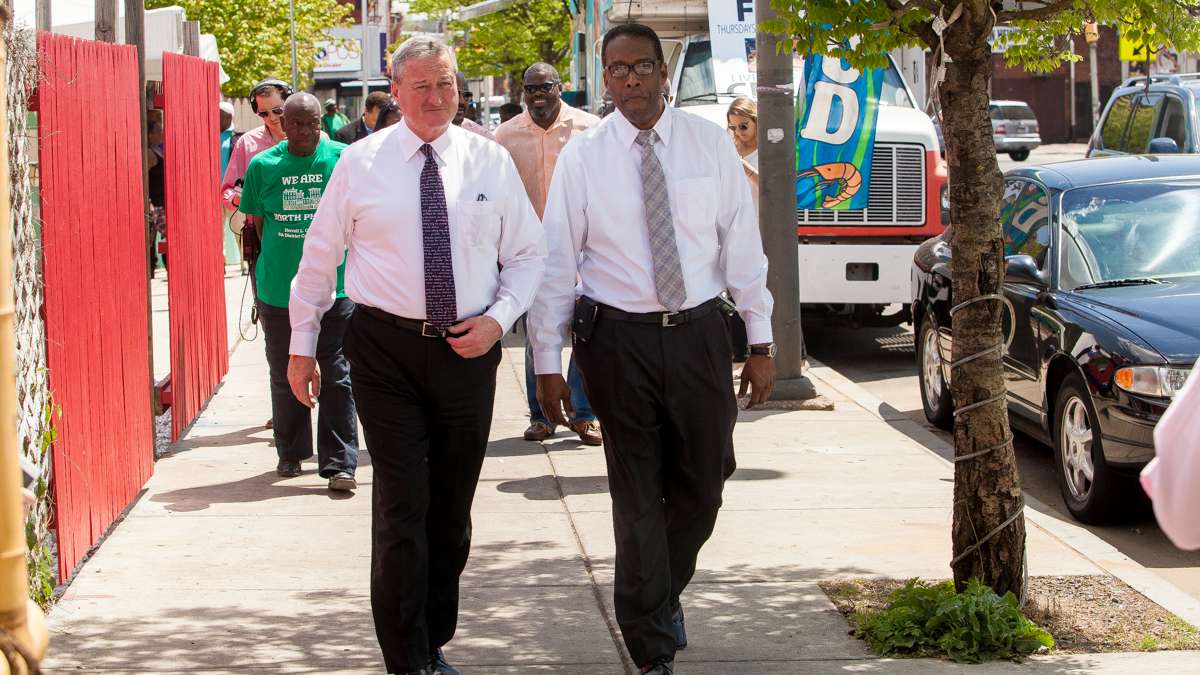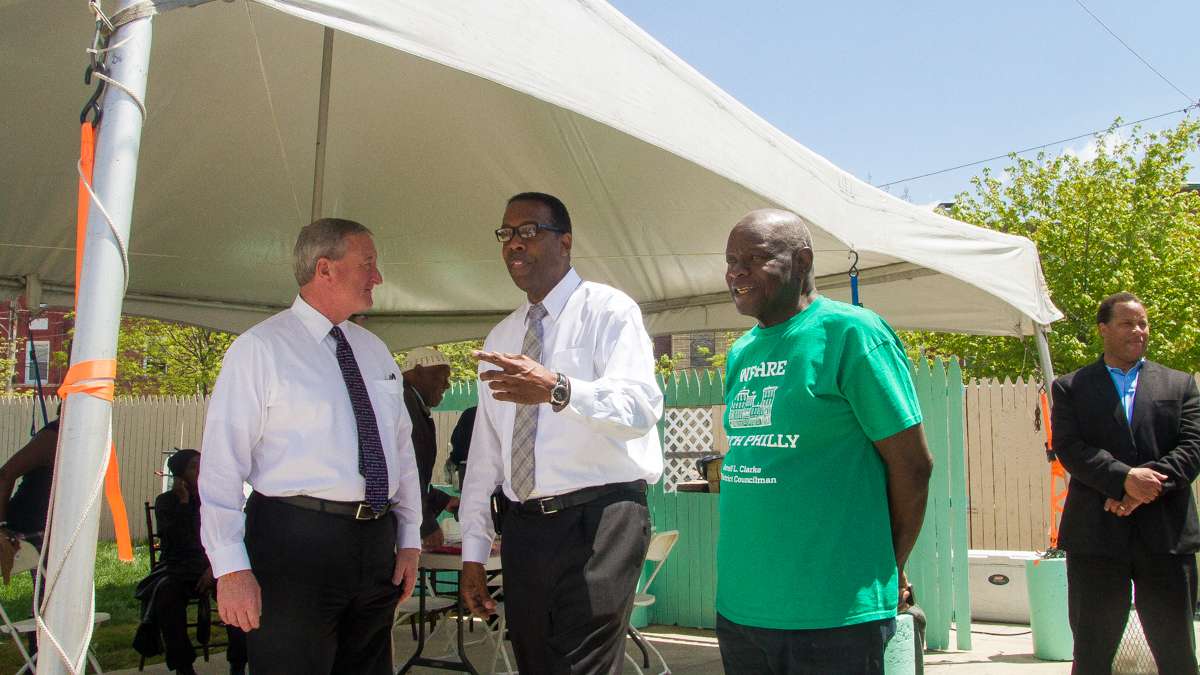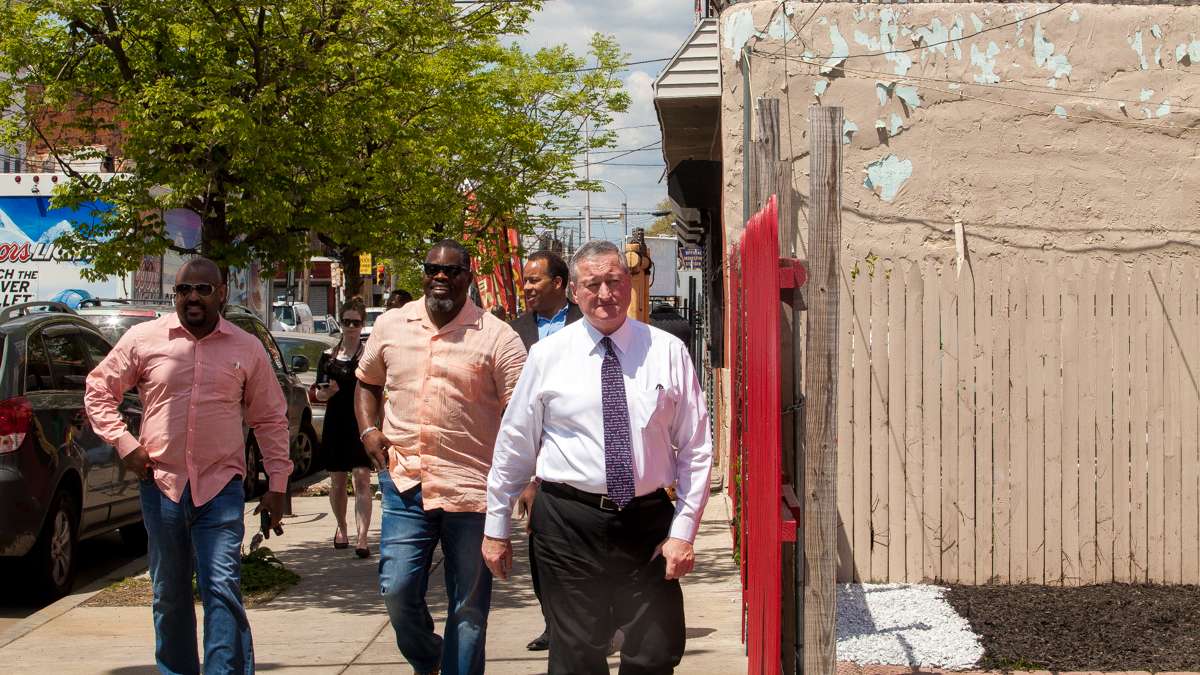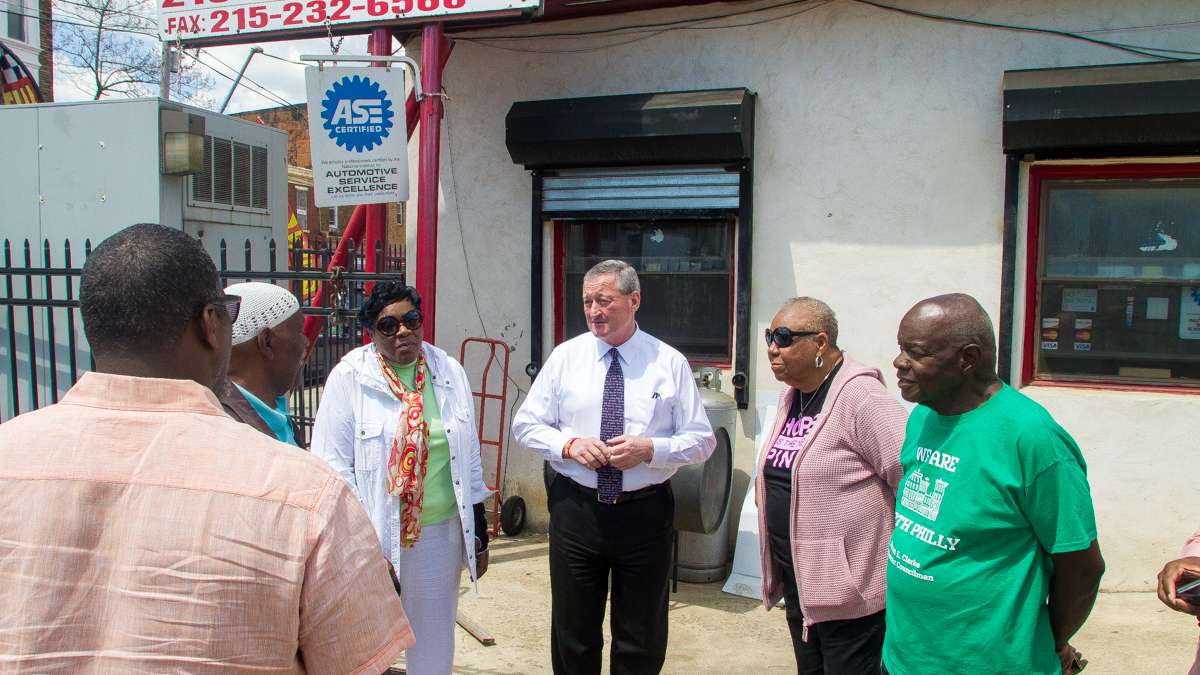Jim Kenney’s evolution is apparent–independence not so much
ListenBy now, you’ve probably seen an ad or two for the presumed front-runner in the race.
If you know anything about Jim Kenney, you probably know he’s been on City Council for more than 20 years, that he’s from South Philadelphia, and maybe that he’s supported by many of the city’s major unions.
I followed Kenney around a few weeks ago for a day of campaigning.
Check out our Pocket Voters Guide here.
At I0:30 on a Saturday morning, Kenney was already making his second campaign stop, speaking to a largely African-American crowd at the headquarters of State Representative Cherelle Parker. Getting the support of black politicians from Northwest Philadelphia has been something of a coup for Kenney, and none has been more supportive than State Representative Dwight Evans.
“Though we may be from different neighborhoods, we all are in this together. And that’s why I’m proud for Jim to be running,” Evans said, firing up the crowd.
So how did this son of a city firefighter–from a neighborhood that’s been known to be somewhat insular–come to assemble a broad coalition of supporters that includes leaders in the black community, the labor movement, and various progressive causes? The answers come haltingly over the course of Kenney’s life and career.
Kenney grew up at Third and Snyder, a working class Irish South Philadelphia neighborhood known as the home of the Mummers. Kenney himself was a mummer in his younger days. He says being around public servants inspired him to serve the city.
“My father would take us to the station house and we’d play around, and all kids love to play around on the fire engines and ladder trucks,” Kenney says. “My father’s friends were firefighters, they did other things too, and I found them all and the police officers to be people who want to serve, who want to serve others and who are willing to give their life in service to others.”
Rather than following in his father’s footsteps, though, Kenney became drawn to politics—taking some cues from the Jesuit priests who schooled him.
“The issue of public service has always been, from my early childhood, seeing my dad serve the city, but then also going to St. Joe’s Prep and having the Jesuits teach you what service really means, and how you really make yourself happy by being in service to others,” he says.
Kenney started his political career while still in college working for State Senator Vincent Fumo. He eventually became Fumo’s Chief of Staff.
“He understood that people who came and who he dealt with were there because they had a problem,” says Howard Cain, who worked for Senator Fumo with Kenney in the 1980’s.
“And they looked towards the government, in that sort of vague notion of what is the government, to help them solve their problem. And I think he appreciated the fact that they did have a problem, and I think he was committed to trying to find a solution,” he says.
That’s something Barbara Capozzi has firsthand experience with.
“Sometimes you have to just go sit with somebody who understands a broader array of issues and how they really impact people just to feel like you’re talking to someone with common sense, who has street smarts and book smarts, and that’s why he’s been very helpful to us,” says Capozzi.
Capozzi has been a community leader in South Philadelphia since the 1980’s. She announced a run for city council earlier this year but dropped out when she failed to get Democratic party support.
“He’s very funny. You can always tell what he’s thinking because his face gets red. We’ve not always agreed, but I actually have to tell you that in the last two or three years, I haven’t seen his face red in a long time.”
Capozzi says Kenney has helped her community work through issues related to property taxes and parks. But she says what’s surprised her the most about Kenney is the range of his understanding of issues—including those outside the community where he grew up.
“The most interesting interaction we’ve had lately, I reintroduced him to the head of the Black Clergy, who’s a wonderful man, Pastor Griffith, and we set up an hour’s lunch,” she recalls. “Lunch turned out to be a three and a half hour lunch because, and I was amazed, and Jimmy was dazzling in his knowledge of black history and in his depth of reading about history and how it affected Philadelphia, etc… and we had only set the lunch up the day before at 4:00. So I teased and I said gee Jim, you read an awful lot since 4:00 yesterday afternoon.”
Kenney wasn’t always seen as an advocate for all city neighborhoods. In the 90’s, Kenney championed issues that could be described as conservative. He authored a bill to ban aggressive panhandling, supported school vouchers, and opposed a civilian board to review police conduct. He also voted against a bill to ban military-style assault weapons in 1993, though he voted for the ban 15 years later. Some of his comments from that time became grist for an ad from State Senator and mayoral candidate Anthony Williams.
Kenney has said he regrets those comments, made in 1997, but that they did represent his position at the time. However, Kenney also pushed for domestic partnerships in the 90’s. Now, he’s an outspoken supporter of same sex marriage and other LGBT rights.
“My philosophy has not changed. I think the way in which I express my philosophy has changed,” says Kenney. I mean I’m still the same person in the mid-90’s that was supporting domestic partnerships, and that wasn’t an evolution for me. I mean I’m not a different person than I was in ’92, I just express myself differently, and I am more adept at messaging and explaining to people what I think and what way I think the city should go.”
Kenney is known to have a temper. One incident stands out to Howard Cain. It was the early 90’s, and Kenney was still working for Senator Fumo. Fumo’s political rival, former Philadelphia mayor Frank Rizzo, had a daily radio show, and Kenney was asked to make a tape recording of each one.
“Every day at 3:00, the ex-mayor would come on, and by 4:00, Jim would become so angered at what the ex-mayor was saying, the office staff knew not to bother him,” says Cain. Between 3:00 and 5:00, you just let him be because he was working himself up into a real fit of anger. And one time I saw him throw a beeper against a wall with such force that it lodged in the wall.”
What some call a temper others—including Barbara Capozzi—call passion.
“I mean let’s face it, there’s a lot of things to get upset about in this city and the way it runs and all the needs that go unmet, and Jim gets upset about them and his face turns red, so we tease him, but he’s been a very good advocate for an awful lot of people,” says Capozzi.
Kenney himself downplays his reputation for ire, comparing it to that of a past mayor.
“I don’t have a temper anywhere close to Ed Rendell’s volcanic eruptions. I mean, I’ve seen him pick up furniture and throttle reporters, and I’ve never done that in my career.”
What Kenney has done is garner the support of all of the municipal unions in Philadelphia, and many of the building unions. Most notably, Local 98 of the International Brotherhood of Electrical Workers has funded an independent group, Building a Better PA, that’s running ads on Kenney’s behalf. Local 98 is headed by John Dougherty, who grew up in the same South Philadelphia neighborhood as Kenney.
Multiple sources who declined to be interviewed on the record for this story expressed concern about the money Local 98 is throwing behind Kenney. But one who would talk on tape is former Philadelphia Managing Director Phil Goldsmith.
“I think the issue we have in this campaign is the independent expenditures, and I put independent in quotation marks,” says Goldsmith. “I don’t think that anyone that understands or has been around Philadelphia politics thinks that these contributions aren’t in some way shape or form coordinated with the campaigns.”
Kenney defends his union support.
“Working families are supporting me, people who work for a living are supporting me, and I’m very proud of that, and would be proud of it whether I win or lose,” he says.
“Any Democratic front-runner is likely to have union support in any mayoral election in Philadelphia,” says Zach Stalberg, the recently retired President and CEO of the political watchdog group the Committee of Seventy.” “But it comes down to the individuals, and Jim I think is definitely close to the municipal unions and to the city unions in general. And that could be a problem moving forward… Jim has always struck me as not quite having enough nerve, and wanting to be connected to some other team. And so I think if people have concern about his relationships with Johnny Doc, then that’s a fair concern.”
Kenney has supported unions in actions as well as words. In 2013, he appeared in a video criticizing the Post Brothers—developers building the Goldtex Apartment complex in Philadelphia, who were not employing union workers. The video, called “Deconstructing Post Brothers,” was financed by the Philadelphia Building Trades Union, whose members include Local 98.
Kenney hasn’t just been a friend to the building trades. He also controversially altered payments to city pensioners. Mark McDonald is a spokesman for Mayor Michael Nutter, who as a councilman in 1999, set up the special payments, which would go out if the city’s pension investment exceeded its goals.
“The idea was that if there was going to be special payments to retirees based on the performance of the pension fund, one of the conditions for that to happen was that the pension fund would be relatively healthy.”
The condition of the payments was that the pension fund have at least 76 percent of the money it owed to retirees. In 2007, Kenney introduced a bill that eliminated that threshold.
“It set up a situation where in the years that followed, you potentially would have disbursements being made out of the pension fund, out of the pension adjustment fund, to pensioners when the fund really wasn’t healthy enough to do it, to handle it.”
The first such payments—31 million dollars—went out to retirees this month despite the fact that the pension fund has less than 46 percent of the money it owes. But Kenney defends his bill, calling the payments “cost of living adjustments.”
“I had people who were widows of firefighters and police officers killed in the line of duty who were getting under a thousand dollars a month in the pension raising three kids by themselves,” Kenney says.
It’s worth pointing out that there’s no negotiated cost of living adjustment for pensions in the city union contracts, and critics of the bill say while they feel for retirees, there’s just not enough money in the city’s beleaguered pension fund to make such extra payments.
Back out on the campaign trail, Jim Kenney is wrapping up another campaign stop—this time shaking hands with visitors at the annual Mt. Airy Day festival. These aren’t necessarily supporters, and one skeptical resident grills Kenney on his plan for helping ex-offenders.
With a calm demeanor and practiced poise, Kenney lays out his position—no principled outburst here. After 23 years in City Council, maybe Jim Kenney has finally learned how to be a politician.
WHYY is your source for fact-based, in-depth journalism and information. As a nonprofit organization, we rely on financial support from readers like you. Please give today.


